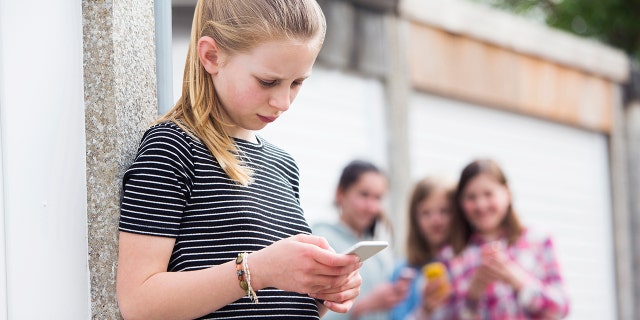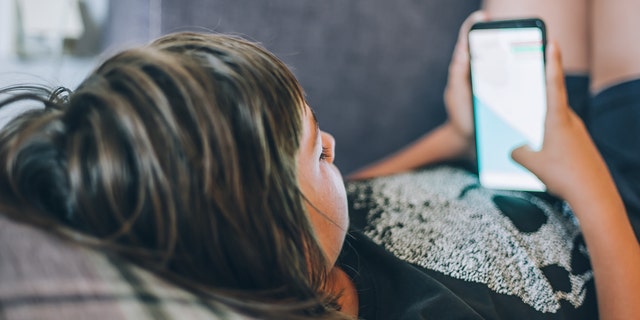
“I can’t do anything right.”
“I do not enjoy life.”
“My life is not useful.”
The share of teens who agree with these phrases has doubled over the past decade, according to an annual poll conducted by the University of Michigan — and one expert asserts that the increase in depressive symptoms is tied to the rise of social media.
SURGEON GENERAL RELEASES ADVISORY CALLING FOR IMPROVED SOCIAL CONNECTION
In her book, “Generations: The Real Differences Between Gen Z, Millennials, Gen X, Boomers and Silents — and What They Mean for America’s Future,” Dr. Jean Twenge, a psychologist and a professor at San Diego State University, highlighted the poll’s results as a means of linking the spike in teen depression to the increase in social media use.

The share of teens who agree with these phrases has doubled over the past decade, according to an annual poll conducted by the University of Michigan. (iStock)
Since 1991, the University of Michigan has polled 50,000 students in 8th, 10th and 12th grades about their level of agreement with those three questions.
After 2012, the number of students expressing agreement with those sentiments started to climb.
In particular, the number of students who agreed with the phrase “I do not enjoy my life” has more than doubled in that decade.
“Frequent and prolonged social media use is associated with elevated risk for psychological distress.”
Ryan Sultán, M.D., an adult and pediatric mental health physician at the Columbia University College of Physicians and Surgeons in New York City, agreed that social media presents mental health risks — but he pointed out that Twenge is demonstrating correlation rather than causation.
SURGEON GENERAL’S ADVISORY ON SOCIAL MEDIA AND YOUTH MENTAL HEALTH COMES AMID ‘REAL-TIME EXPERIMENT’
Sultán was not involved in the poll.
“I think it’s a fair conclusion that one might make from looking at this data,” he told Fox News Digital in a phone interview. “However, I think it’s important to acknowledge that this is not a scientifically rigorous, peer-reviewed analysis.”

“Despite the potential benefits of social media for some groups, the prevalent theme is that frequent and prolonged social media use is associated with elevated risk for psychological distress,” an expert said. (iStock)
Dr. Zachary Ginder, a psychological consultant and doctor of clinical psychology at Pine Siskin Consulting, LLC in Riverside, California, was also not involved in the poll but said the correlation between depression and social media use aligns with previous research.
“Despite the potential benefits of social media for some groups, the prevalent theme is that frequent and prolonged social media use is associated with elevated risk for psychological distress, such as depression and anxiety, for children and adolescents,” he told Fox News Digital in an email.
TEEN GIRLS ARE STRUGGLING WITH MENTAL ILLNESS AT RECORD LEVELS, WITH MANY ‘PERSISTENTLY SAD,’ DATA REVEALS
“Unfortunately, this trend appears to be increasing in severity.”
As young people rely more heavily on their screens for their social interactions, Ginder noted that there are far fewer opportunities for real-life, person-to-person relationships.

As young people rely more heavily on their screens for their social interactions, an expert said there are fewer opportunities for real-life, person-to-person relationships. (iStock)
“These apps are designed to support dependency, and a young person’s natural tendency to ‘compare and despair,’” he said. “Prolonged social media use is opening the door for psychological distress for an already vulnerable segment of our population.”
He added, “It’s akin to throwing fuel on a fire.”
Social media is ‘not going anywhere’
While Sultán agreed that social media poses serious risks for kids, he said the real problem is that it’s undermining the protective factors that help to prevent depression, such as fostering close relationships, spending time outdoors and participating in physical activity.
Kids also need to have stability at home to boost their mental health, said Ginder.
“It’s a system that was designed to be addictive.”
Proper nutrition, opportunities for positive social interaction and quality sleep routines are also important, he said.
“Ultimately, social media is not going anywhere,” Sultán noted. “I don’t think it’s realistic to make it go away, but we should push for limitations on it for kids and teens.”
TEEN GIRLS SPEND MORE TIME ON ‘SENSITIVE’ SOCIAL MEDIA CONTENT THAT CAN HARM MENTAL HEALTH, REPORT SAYS
Part of the reason social media has become so problematic for kids is that they are less able to regulate themselves, Sultán explained.
“It’s a system that was designed to be addictive, to get them to keep using it,” he said. “And kids’ brains are not as developed as adult brains.”
At a minimum, Sultán recommended that parents set guidelines for kids to stop using devices at a certain time each evening.

Experts recommend that parents set guidelines for kids to stop using devices at a certain time each evening. (iStock)
“I think there needs to be a larger discussion and a societal expectation,” he said. “We need to think about how to set expectations for reasonable social media use and to enforce those in a larger way.”
Ginder agreed that children and teens often lack the ability to self-regulate their social media use and manage their impulses — especially as they are experiencing peer pressure and forming their identities.
“In addition, mental health concerns often begin to emerge between the ages of 14 and 18,” he told Fox News Digital.
CLICK HERE TO SIGN UP FOR OUR HEALTH NEWSLETTER
“All of this creates a very difficult circumstance for teens to navigate without support.”
In May, Surgeon General Dr. Vivek Murthy released an advisory titled “Social Media and Youth Mental Health,” warning about the potentially negative impact of social media on children and teens.
CLICK HERE TO GET THE FOX NEWS APP
The 25-page advisory outlines the potential risks, including depression, anxiety, disordered eating, sleep problems, attention disorders, low self-esteem, feelings of exclusion and suicidal ideations, among others.

 Latest Breaking News Online News Portal
Latest Breaking News Online News Portal




